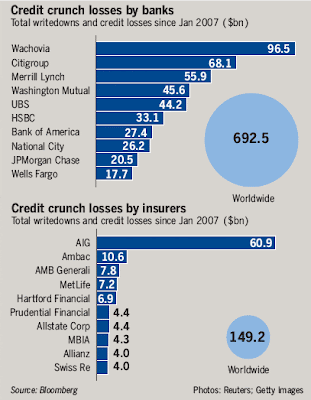How should we view Warren Buffett's short put position? The
FT has some comment which clarifies both Buffett's thinking and the conflict between insurance and capital markets views of risk. It is useful background
to my earlier post about this position.
First the facts. Berkshire has sold long dated out of the money (forward) puts on major indices and received premium upfront. These puts are getting closer to the money as the indices concerned fall, giving rise to mark to market losses.
John Gapper's FT article points out that Buffett is usually thought of as a great investor - and he really is one - but what is less commonly discussed is where the money came from for that investment. The answer is that it is often from writing insurance. That is, Berkshire is a classic insurance company: it writes insurance, receives premiums, and invests them in the attempt to produce a bigger pot of money than is needed to meet claims. It has been highly successful at this.
The two different communities, insurers and derivatives folk, look at risk in entirely different ways. An actuary would ask how like a risk is to be manifest and what it will cost the insurer if it is based on history. A derivatives trader would ask what the market price of the risk is. Thus insurers and investment banks made great trading partners as the insurer will often take risk for far less than the bank thinks it is worth. This is one of the reasons AIG wrote so many default swaps: they thought that they were being well paid for them.
Another point is that for classical insurance risks like catastrophe, auto or terrorism, the accounting for the risk is on the basis of received claims. You don't take a mark to market hit on the hurricane book if the weather gets worse in the North Atlantic: you only have to provision for the loss when claims are both likely and can be estimated. This is very close to accrual accounting in banks loan books.
Derivatives, though, are different. Here Warren has to mark to market, so Berkshire suffers earnings volatility regardless of whether the puts really will pay out or not, a fact that anyway won't be known for many years. Why are investors spooked by a mark to market write-down on a derivative with eleven years left to run when they are perfectly unphased by the warming Atlantic, something that could - if it generates more hurricanes like Katrina - devastate Berkshire's cat book? Investors seem overwhelmed by the risk that they are being forced to look at, yet indifferent to the ones the accounting glosses over. Interesting, isn't it?
Labels: Accounting, Insurance











